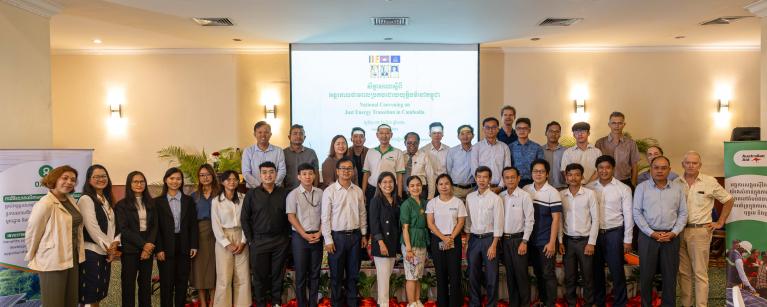As the world grapples with the urgent threat of climate crisis, Cambodia stands at a critical crossroads. The country's transition to renewable energy sources is imperative to both mitigate climate impacts and ensure a sustainable future for its people. However, the energy transition must be just, equitable, and inclusive, leaving no one behind.
For Cambodia, CSOs have acknowledged and appreciated the government's efforts and dedication towards facilitating an energy transition that considers the socio-economic and environmental ramifications. This recognition extends to commitments such as refraining from constructing new coal power plants in Cambodia and imposing a moratorium on large-scale hydropower dams on the mainstream of the Mekong River, acknowledging the potential threats they pose to the environment, ecosystems, and the livelihoods of local communities.
A National Convening on Just Energy Transition in Cambodia, held on August 21-22, 2024, brought together 40 representatives from civil society organizations (CSOs), private sector, research institutions and academia. The convening underscored the urgent need for Cambodia to accelerate its efforts in energy transition and provided a comprehensive roadmap for the government officials, policymakers, private sector, development partners, donors, researchers, academia, CSOs and communities to work together towards a more sustainable and equitable energy future. This incorporates the integration of gender considerations into the analysis and planning of just energy transition initiatives, ensuring the active participation of women and individuals with diverse gender identities in program development and implementation within the country.
The first day of the National Convening brought together the experts to discuss the current energy landscape and policies of Cambodia, encompassing the energy transition roadmap, just energy transition projects implemented across Cambodia and the perspective around gender and social inclusion dimensions in the energy sector in Cambodia. These crucial components are vital for establishing a fairer, more comprehensive, and environmentally friendly energy industry that serves everyone in society. On the second day, experts gathered to discuss current challenges and important issues regarding a fair, just and equitable energy transition in Cambodia. They discussed opportunities and solutions, leading to key propositions for the relevant stakeholders.
At the heart of a just energy transition lies the recognition that the benefits of clean energy must be shared equitably among all citizens, especially the affected and most vulnerable communities. This means ensuring that communities have access to affordable and reliable energy source, protecting the environment, and promoting social justice. To achieve this, the CSO representatives at the National Convening put forward the following key propositions for Cambodia on Just Energy Transition:
The Royal Government of Cambodia:
- Create a conducive environment for renewable energy investment by updating regulations, streamlining procedures, and improving and diversifying infrastructure, decentralizing renewable energy investment through allocating government funding to support community-led renewable energy. This includes allowing the connection of renewable energy to the national grid and enhancing the technical and monitoring mechanisms.
- Uphold its commitment in moratorium on large scale hydropower dam on the mainstream of the Mekong River that are potentially harmful to environment, ecosystems and local communities 'livelihoods.
- Shall consider taxes incentive and duties on import of renewable energy technologies and reduce registration requirements for private sector businesses that are focusing on Renewable Energy Service and Renewable Energy Technologies.
- Enabling the safe space for CSOs to create a just energy transition dialogue among key stakeholders.
Civil Society Organizations:
- Promote awareness of sustainable renewable energy to public citizens and hold the government accountable for its commitments toward sustainable renewable energy.
- Convince donors and development partners to increase funding to support community-led initiatives on sustainable renewable energy development.
- Facilitate capacity building and knowledge sharing to communities, government officials, and businesses on renewable energy technologies, actively engage in renewable energy policy development, and project management.
- Co-support community-based renewable energy projects that provide energy access and economic opportunities to marginalized people.
Private Sector:
- Invest in diversified renewable energy projects to increase the country's renewable energy capacity considering the socio-economic and environmental impacts assessments.
- Develop innovative financing mechanisms to support sustainable renewable energy projects and attract more investment for sustainable renewable energy initiatives. This includes having available concessional loans and green loans to communities.
- Integrate sustainability into corporate social responsibility programs by investing in sustainable renewable energy, reducing carbon footprints, and supporting community-based initiatives.
- Build a strong private sector, CSOs and communities network focusing on sustainable renewable energy.
Development Partners and Donors:
- Allocate more funding to sustainable renewable energy projects, community-owned renewable energy projects, renewable energy technologies, capacity development programs, and policy development. Funding should go directly to the CSOs and community-based organizations, with specific earmark for Indigenous Peoples, Women-led and other marginalize group shall be accounted for 20-30 per cent.
- Capacity development program support by development partners shall aim to facilitate the renewable energy technologies transfer and expertise to Cambodian.
- Establish sustainable renewable energy platform among key stakeholders including CSOs, private sector, government officials, development partners, donors, researchers, policy makers, academia and communities.
A just energy transition is not only about achieving climate goals; it is also about building a more equitable and sustainable future for Cambodia. By working together, the government, civil society, private sector, international partners, donors, researchers, policy makers, academia and communities can ensure that this transition benefits all citizens and leaves no one behind.
